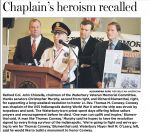|
|
||||||||
Main Site Links --> Intro | Indy Story | Captain McVay | Seeking Justice | Mochitsura Hashimoto | Survivors Ordeal | Final Crew | Second Watch | * Home * |
| Post Info | TOPIC: USS Indianapolis Chaplain Lt. (Rev.) Thomas M. Conway | ||||||||
|---|---|---|---|---|---|---|---|---|---|
|
|
|
||||||||
|
|
|
||||||||
|
|
|
||||||||
|
|||||||||
|
|
||



|
| ; |

